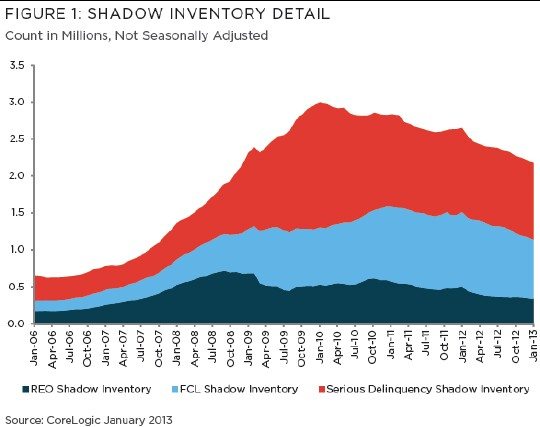One of the characteristic features of the bursting of the housing bubble has been the incessant hand wringing of the housing bears over the shadow inventory – the inventory of homes that are either seriously delinquent, in foreclosure, or already owned by lenders, but not yet listed for sale. The concern has been that this inventory overhang was going to keep home prices depressed for centuries (I’m exaggerating a bit).
Well, CoreLogic recently released their 4th quarter shadow inventory report and it shows a continued, steady decline from the peak in 2010 at the national level – a cumulative 28% decline. In the graph below, which breaks out the three components, you can see just how far we’ve come in working through this inventory. Yes, if you extrapolate the decline it looks like we have several more years to go but it’s not like this stuff is going to just flood the market any day now. It should continue to hit the market in an extremely controlled fashion.
According to Anand Nallathambi, president and CEO of CoreLogic:
The shadow inventory continued to drop at double the rate in January from prior-year levels. At this point in the recovery, we are seeing healthy reductions across much of the nation. As we move forward in 2013, we need to see more progress in Florida, New York, California, Illinois, and New Jersey which now account for almost half of the country’s remaining shadow inventory.
Dr. Mark Fleming, Chief Economist of CoreLogic adds:
The shadow inventory is declining steadily as properties are moving through the distressed pipeline. States like Arizona, California, and Colorado are experiencing significant declines year over year in the stock of serious delinquencies, a positive sign for further improvement in the shadow inventory.
Keep in mind though that there is another form of shadow inventory out there that I think is even more ominous and the real threat to any sustained upward price trend: the substantial inventory of underwater and near underwater homes that are not delinquent but can’t be sold because of the horrendous financial consequences to their owners who really want to move. As prices improve and these potential home sellers get out from under the weight of their mortgages we will see these homes hit the market, keeping a lid on further price increases.
If you want to keep up to date on the Chicago real estate market, get an insider’s view of the seamy underbelly of the real estate industry, or you just think I’m the next Kurt Vonnegut you can Subscribe to Getting Real by Email.
